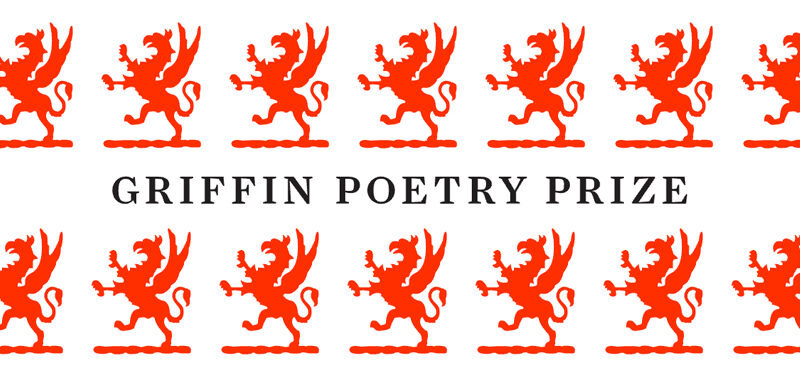Today, the Griffin Poetry Prize—the world’s largest international prize for a single book of poetry published in English—announced its 2025 shortlist, which was winnowed down from a pool of 578 submissions, including 47 translations from 20 languages, representing 219 publishers from 17 different countries. The prize is judged this year by Nick Laird, Anne Michaels, and Tomasz Różycki; the winner will be announced at a ceremony in Toronto on June 4th, and will receive C$130,000. Each other shortlisted poet will be awarded $10,000.
In the meantime, here’s the shortlist, along with the judges’ citations for each work:
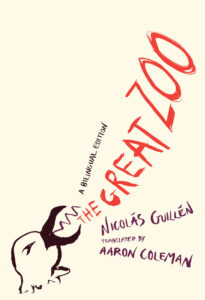
Nicolás Guillén, tr. Aaron Coleman, The Great Zoo
The University of Chicago Press
Judges’ citation: The Great Zoo by Nicolás Guillén is one of the masterpieces of Latin American poetry. Originally published in Spanish in 1967 and translated by Aaron Coleman with a subtle understanding of the contexts of colonial oppression and exoticism, this bilingual edition remains a relevant commentary on our times. The Great Zoo seeks to integrate history, society, nature, and dreams into the territories of this singular park. It is not only an atypical bestiary of nonsensical and imprecatory zoography, not only a humorous book of fables with strange morals, but also a surprising essay of social criticism that mocks the taxonomic and classificatory pride of man pretending to gather, in cages, the living complexity of nature. The zoo’s fauna comprises ideas, emotions, phenomena, anthropomorphized animals, and men who are animals; the descriptions of the species are masterpieces of suggestion, working on our imagination with great force. The book, entertaining and moving, is simply beautiful.
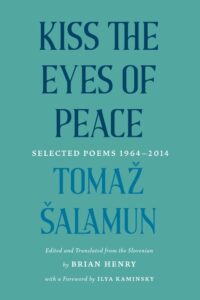
Tomaž Šalamun, tr. Brian Henry, Kiss the Eyes of Peace
Milkweed Editions
Judges’ citation: Kiss the Eyes of Peace is an extraordinary English selection of poems from the entire body of work of one of the best Central European poets of the twentieth century, Slovenian poet Tomaž Šalamun, presented by poet Brian Henry with precision and power. The English reader experiences this poetry at its finest, with its characteristic post-Dada, unlimited freedom, and a peculiar and unmistakable lightness of diction. Šalamun turns our reading habits upside down—he creates avant-garde linguistic structures in which the poem hangs on the question, on the collision of the concrete and the surrealistic, where a dance of imagination begins. A hypnotic sequence of extremely condensed phrases makes Šalamun’s absurdism a realistic portrayal of a contemporary world where strangeness can be a source of extraordinary beauty. This selection restores faith in the glory and power of poetry, in its wild freedom and beauty.
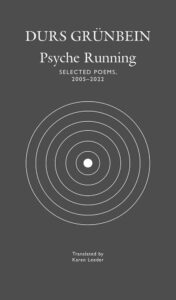
Durs Grünbein, tr. Karen Leeder, Psyche Running
Seagull Books
Judges’ citation: Durs Grünbein’s Psyche Running is a brilliant overview and selection of a poet who satisfies our hunger to be serious, as again and again he finds himself “between words and things.” Karen Leeder’s adept translations establish a new version of Grünbein in English: universal, lyrical, philosophical.
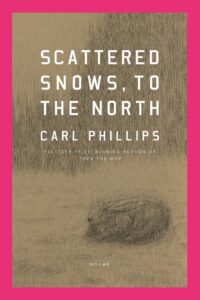
Carl Phillips, Scattered Snows, to the North
Farrar, Straus and Giroux
Judges’ citation: It is Carl Phillips’ mastery that these poems measure, weigh, question, prevaricate: “it seemed,” “maybe,” “what if,” “it’s hard, these days, to know for sure what’s true,” “We weren’t afraid. Nor / unafraid.” And it is Phillips’ magic that this diction renders greater precision, not less; an astonishing accuracy in naming the liminal space from which our comprehension, acceptance, farewells, memories emerge and submerge again. Phillips has found a way to articulate love in all its assertions and disguises— calibrated in all its doubt, tenderness, forms of desire, loyalty, solitudes. In the poem “Stop Shaking,” he writes: “I keep making the same avoidable / few mistakes that I’ve always made, and then regretting them, / and then regretting them less.” In tone and diction, these poems never stray across the line between honesty and privacy. How grateful the reader is to enter and re-enter these poems, to be entered by them. For in their articulation of what is most elusive—what we cannot understand and also somehow know—in their recognition of unanswerable human limitation, is a kind of forgiveness.
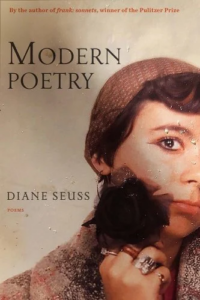
Diane Seuss, Modern Poetry
Graywolf Press
Judges’ citation: Diane Seuss’ Modern Poetry is the culmination of a life spent learning the art, of locating “the beauty of drawing near,” of “seeing through time”—and her wry, compelling tone and effortless technique end in something very like wisdom. She has become an indispensable poet.

